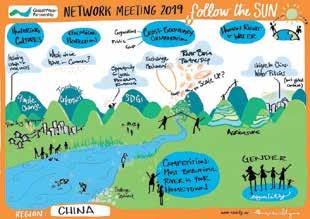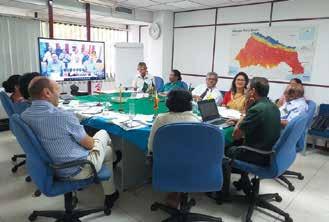
8 minute read
Welcome to GWP in action 2019
Message from the Chair
Welcome to GWP’s annual ‘in action’ report, which highlights the high-impact work of our regional and country teams during 2019. Having completed my first year as GWP Chair in January 2020, I have seen for myself the Network’s ability to mobilise a large and inclusive partnership and take action to improve the way water is Howard Bamsey managed. As we enter uncharted territory in 2020 with the COVID-19 crisis, we will have to discover new ways to reach out to stakeholders at all levels to continue our work in advancing water governance and achieving the Sustainable Development Goals (SDGs).
Advertisement
I have hope for the future because of our youth partnerships. I met many young water professionals and entrepreneurs at the 2019 World Water Week in Stockholm, at a session featuring the Youth for Water and Climate platform. Young people have great ideas and should be given support to take action and implement their proposals. In recognition of the potential of youth to change the way water is managed, the GWP Steering Committee agreed at its December meeting to add a permanent seat for a youth member.
A significant achievement for GWP in 2019, among many highlighted in this report, is its approval as an official Green Climate Fund delivery partner. This will enable our Network to help countries unlock much needed climate finance.
Key results in 2019
45 key water governance outcomes influenced Estimated investment of €360 million linked to GWP’s work More than 80 national institutions assisted in relation to governance processes €13 million mobilised for building drought resilience in the Horn of Africa €240,000 mobilised to develop a hydrometeorological strategy for Central Africa
Direct support provided to more than 10 countries to access resources from the Green Climate Fund 65 knowledge products developed and disseminated 20 south–south learning exchanges held
I hope you find inspiration in the stories featured here. Each one illustrates the unique work we do as the multi-stakeholder platform that delivers on SDG 6 implementation through an integrated approach to water resources management, bringing about decisions that make a real difference to people’s lives and livelihoods all around the globe.
Howard Bamsey
GWP and Cap-Net combine expertise
Cap-Net is a global network for capacity development in sustainable water management. Set up originally in 2002 as part of a United Nations Development Programme (UNDP) project, the network has become a global hub for training and knowledge-sharing across 120 countries. In early 2019, GWP and UNDP agreed to forge a closer relationship, with GWP taking responsibility for managing the administration of Cap-Net. The partners will now be able to align their programmes more closely, with GWP benefiting from Cap-Net’s expertise to implement the training components of the regional and country work programmes.
A word from the Executive Secretary
I am writing this in early April 2020, right when the world is plunging into a global health and economic crisis. Both need the full attention of governments, businesses, and citizens around the world. At the same time, many essentials must continue, and among these is taking smart decisions on how we use and safeguard our water Monika Weber-Fahr and how we protect ourselves from water-related hazards, such as floods and droughts, as the climate crisis continues.
In 2020, the Global Water Partnership enters a new period with the launch of our new strategy, Mobilising for a Water Secure World 2020–2025. The water crisis, in our view, is too big for half measures, so we have committed ourselves to ambitious targets. We are also committed to anchor our work where key global or regional policy frameworks bring leadership focus, progress measurement, development partner action, and potential for financing.
People around the globe are struggling every day with too little water, too much water, or too dirty water. We need water for health, for education, for employment. Only if we achieve sustainable water and sanitation for all will we be able to deliver on the 2030 Agenda for Sustainable Development.
Right now, a network like the Global Water Partnership is needed more than ever before. The world will work hard to manoeuvre its way out of the COVID-19 crises – whether the economic crisis, the crises in governance and decision-making, or the crises in countries’ health systems. Much investment will be released in the months and years to come, in particular for infrastructure. To ensure decisions about investments – drawing on local and regional water resources – are taken in coordination will require the dedicated service of organisations committed to good principles of water management. In the coming years, we will invest in the strengths of our country and regional teams to deliver just that.
Monika Weber-Fahr
From the Chair of Regional Chairs
As GWP’s regional and country teams look to build their response to address the impact of the COVID-19 crisis, I am looking back to the six years of the past strategy Towards 2020 (2014–2019). I have seen us work hard across GWP’s 13 Regional Water Partnerships and 68 Country Water Partnerships to catalyse change, enhance Amadou Hama Maiga learning, and improve the financial sustainability of our own network. And I have seen us achieve much! I recommend taking a look at pages 8 and 9 for a broad summary of GWP achievements during 2014–2019.
Highlights from the regions in 2019 include the mobilisation of €13 million for building drought resilience in the Horn of Africa, the signing of a transboundary agreement by the governments of Mozambique and Zimbabwe, and high-level engagement in the water agenda by the Central African youth water network. Two of the largest river basins in Europe (the Drin and the Tizsa) adopted internationally agreed management plans that will drive an integrated approach to the management of transboundary watersheds, and we were part of this important work. Similarly, we contributed to the establishment of a new river basin partnership for the Yangtze basin in China.
At the country level, new water partnerships were accredited in Botswana, Central African Republic, and Somalia, taking the total number of accredited water partnerships to 68.
Let’s remember that GWP’s results rely on water users, professionals, development organisations, businesses, government ministries, and other institutions working together to address the links between water, health, agriculture, energy, and so on. Only when all voices are heard can political will be converted into action. This is our raison d’être: to connect actors on the ground with our 3,000+ Partner organisations and build long-standing relationships with mandated institutions at all levels.
Amadou Hama Maiga
GWP’s unique value is the ability to mobilise action on the global water crisis through a unique combination of social capital, shared values, credibility within the global water community, bottom-up orientation, and expertise. A network of networks, we ensure the ‘voices of water’ can influence local, national, regional, and global development priorities. We are committed to our role as a neutral convener and respected for our focus on inclusiveness and sustainability.
Partner engagement
The annual GWP Network Meeting in 2019 took the form of a 29-hour multi-point video conference event. The main topic was the new 2020–2025 strategy and its implications for our partners. In all, some 330 Partner organisations in 47 countries participated in the event, with all sessions broadcast live on Facebook. Partners endorsed the new strategy and the need for urgency in ensuring an equitable and sustainable approach to water resources as a key aspect of development.


the #BalanceforBetter pose, with 400 participants from more than 40 countries demonstrating their commitment to gender equality. Posts and comments highlighted GWP’s value as a multi-stakeholder platform to coincide with World Water Week and the launch of the new GWP Strategy 2020–2025.
Partners from GWP South Asia join in the Network Meeting
Also to engage GWP Partners, during International Women’s Day and World Water Day, GWP supported the UN-Water campaign #LeavingNoOneBehind. GWP launched an Instagram account during the lead-up to International Women’s Day, showcasing the Network doing

People taking part in the #BalanceforBetter campaign
Water resources management during and after the COVID-19 crisis The COVID-19 outbreak in early 2020 changed nearly every aspect of living and working around the world. The immediate pain of loss of life is unspeakable. The struggles involved in working our way out of one of history’s deepest global recessions will require all hands on deck. Our role will be to keep attention on the water security agenda and on climate resilience. Our unique global network and our competencies will and can contribute where countries and their global and regional development partners plan for larger investments, as many of the post-COVID packages focus on expanding infrastructure, improving urban development, and ensuring food production. None of these are possible without water. And in most countries of the world, GWP can mobilise its relationships to create transparent and constructive dialogue on water use and the impacts of development on water. The year 2020 looks set to become one of the hottest on record. With water scarcity on the rise, we will plea for jointly re-building our health through solidarity and caring for each other, reminding all stakeholders that we share one source of water. Managing water is a task for everyone, and GWP will be there to promote and support good water management practices, participatory and inclusive decision-making, integrity, and long-term solutions that fully take into account the value of water for today’s uses and the needs of future generations. The water community offers ready-made tools to inform decisions and financing in post-emergency situations, drafted in the context of natural disasters, but fit for use in any reconstruction context. Cap-Net offers specific learning and collaborative tools for utilities, which are key partners in the COVID response. GWP will continue to offer updates on relevant tools at https://www.gwp.org/en/About/covid-19/how-gwp-responds-to-the-covid-19-crisis/.









